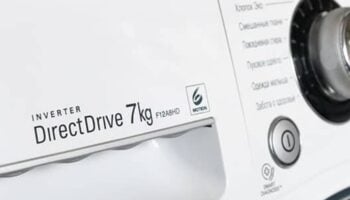We've independently reviewed this article to make sure it's as accurate as we can make it.
To find out more about our article creation and review process, check out our editorial guidelines.
Are you shopping for a new washer but unsure what to look for?
You’re not alone! In this washing machine buying guide, I’ll help you make the right choice.
On average, 13.3 million washers are purchased annually in the United States. With so many options available, it can be challenging to make a decision.
Don’t worry, though. With over seven years of experience repairing and covering appliances, I’ve created a list of key factors you should consider when buying a washer.
In this article, I’ll walk you through the differences between the main types of washers and their modern features (and the ones you can skip) and answer your most common questions about buying a washer.
Keep reading our washer buyer’s guide to make the right choice.
Types of Washing Machines
The first section of this buyer’s guide will cover the different types of washers available.
My usual advice is to consider their differences in design and functionality to buy the washing machine that best fits your needs.
Front Load Washers
The easiest way to recognize front-load washing machines is by looking at their door, which is located at the front of the unit.
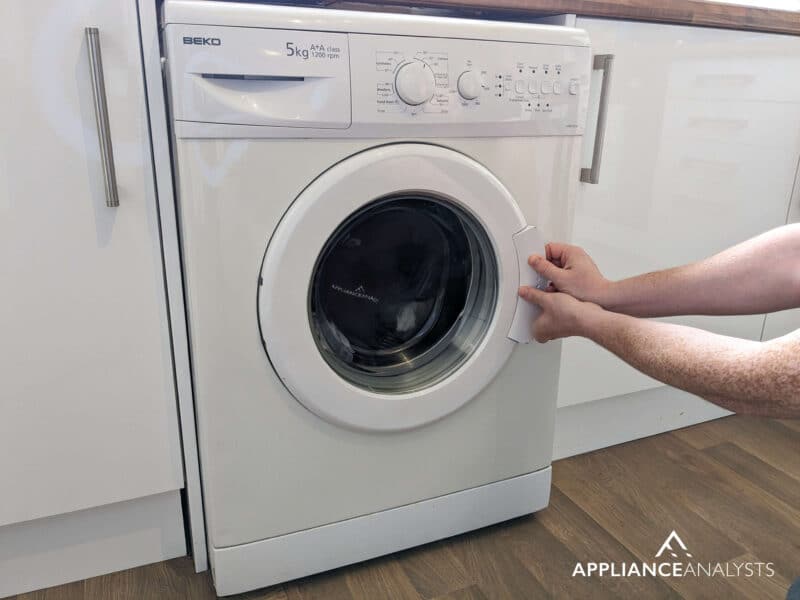
To clean your clothes, front-load washers use a tumbling motion in a horizontal drum. Front loaders are my favorite types of washers because they typically use less water and electricity than top-load machines and are normally gentler on clothes.
However, it’s important to consider that the repair costs of front-load washers are usually more expensive than top-loading machines. They also have more potential to smell if you don’t take care of them.
Top-Load Washing Machines
Top-load washers have a lid on the top of the unit, making loading the clothes in the machine much easier.
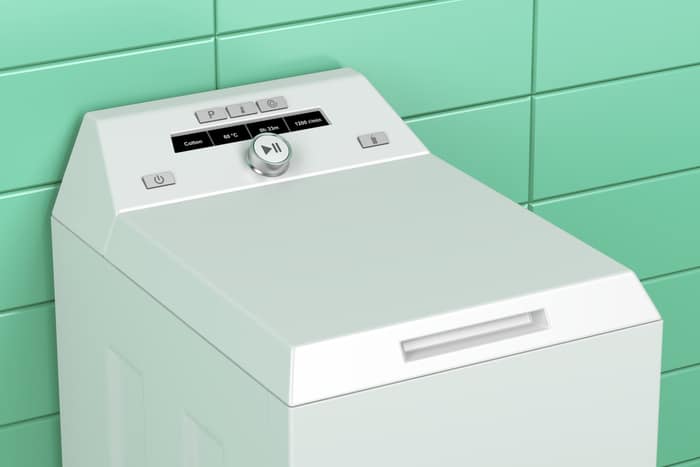
Top-load washers come with an agitator or impeller to move the clothes around the drum and clean them. When choosing between these types, consider that agitators are great for heavily soiled clothes and large loads, whereas impellers are great for delicate clothes.
Top-load washing machines typically can fit into smaller spaces.
Washer-Dryer
A washer-dryer integrates both functions into a single appliance, making it ideal for limited spaces.
Washer-dryers are ideal for small families, as they have a smaller capacity than other types of washing machines.
In my opinion, washer-dryers can be convenient, but they don’t perform as well as separate washing and drying machines. They also require more maintenance, as their functions are integrated into a single unit.
Washer Buying Considerations
Now, let’s move on to a crucial section of our washing machine buying guide: the key factors you must consider when purchasing a new washer.
#1 Size
In my opinion, of the most important factors to consider when buying a new washing machine is the available space.
Having a narrow space to install your washer can impact your decision when selecting a top-load or front-load model.
I recommend measuring the area’s height, depth, and width to ensure that your new washing machine fits perfectly in the designated space. Then, write these measurements down and refer to them when browsing for your new washer.
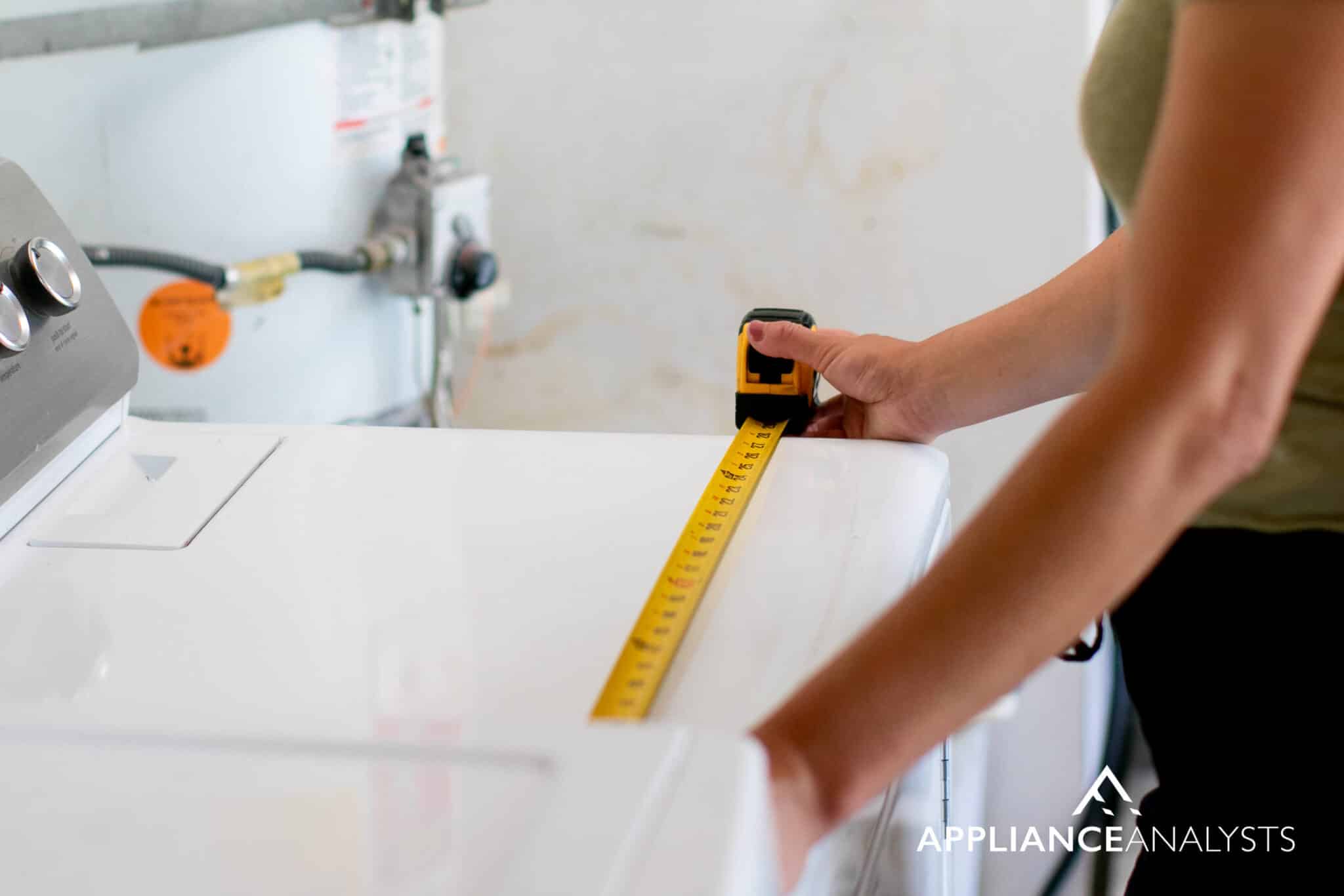
When measuring the space for your washer, ensure it has enough breathing room. You’ll need to leave at least 4 inches (10.16 cm) of space between your appliance and the wall.
Ensuring enough breathing room will prevent heat buildup and keep the hoses from bending.
#2 Capacity
If you’re considering buying a new washing machine, you’ve probably noticed different capacities (small, medium, and large).
But how can you choose the right washer capacity to ensure the best cleaning results?
Simple. You’ll need to consider the size of your household and the laundry weight per load.
I’ve prepared the following table that will help you define the capacity required for your washer:
| Small Capacity (1.5-3.4 cubic feet) | Medium Capacity (3.5-4.4 cubic feet) | Large Capacity (4.5+ cubic feet) | |
| Household Size | 1–2 people | 2–3 people | 3 or more people |
| Lb/kg of Laundry Per Load | 4 to 8 lb (1.8 to 3.6 kg) | 12 to 16 lb (5.4 to 7.2 kg) | 16 to 20 lb (7.2 to 9 kg) |
If you’re wondering how much your average load of laundry weighs, you can step on a scale without holding the laundry basket. Then, weigh yourself holding the basket to calculate the difference.
When in doubt, you should choose a washer with a slightly larger capacity to ensure that it can handle larger loads or items, such as a king-size comforter.
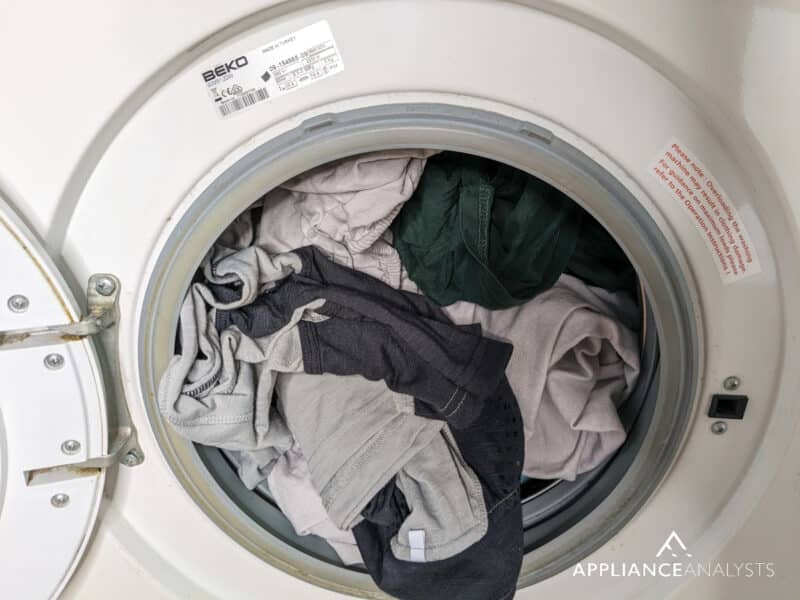
#3 Features
Features are another element you must keep in mind before going shopping for a new washer.
You see, some features are essential for getting the best results. But, to be honest with you, I find other features unnecessary.
The features I recommend looking for when buying a new washer are:
- Automatic dispenser: Automatically dispenses the correct amount of detergent, bleach, and fabric softener at the right time during the wash cycle, which will help you reduce waste and save money.
- Auto-sensing: Automatically adjusts the water level depending on the load size. The auto-sensing feature helps you save water and ensures your clothes come out fully clean when the wash cycle is finished.
- Noise-reducing feature: It reduces the noise produced during the wash cycle. In my opinion, this is a must-have feature if you work from home or if your washer is near your bedroom.
- Extra rinse cycle: Most modern washing machines offer an additional rinse cycle to remove any detergent residue that might be left in your clothes, which is great if you have sensitive skin or heavily soiled clothes. But bear in mind that selecting the extra rinse cycle can increase your energy bills.
- Child lock: If you have kids, try looking for a washer with a child lock, as it keeps them from accidentally tweaking the settings and getting hurt.
You’ll probably come across washing machines that connect to Wi-Fi and are compatible with home systems, allowing you to monitor your laundry using your phone. In my opinion, the Wi-Fi feature is not worth the extra cost, as these washers require more maintenance without offering any other significant benefits.
You’ll also find washing machines that offer a steam feature to reduce wrinkles and sanitize your clothes.
However, according to Consumer Reports, the steam feature doesn’t improve the washer’s cleaning ability and can increase water consumption by 18 gallons.
#4 Efficiency
When buying a new washer, consider how much water and energy it uses. This way, not only will you save money, but you’ll also protect the environment.
I recommend looking for a High-Efficiency or Energy Star-certified washer, as it can help you save up to 20% on electricity costs (which adds up over the years!). On top of that, it uses about 30% less water than regular washing machines.
But bear in mind that the amount of water and energy used can vary depending on the size of the load, the selected cycle, and the type of washing machine.
Click here to learn how much it costs to run your washer!
For example, front-load washers are designed to use less water, thus energy, than top-load machines.
So, if you’re looking to save some extra money and be eco-friendly at the same time, a front-load washing machine is a great choice for you!
Tip: If you’re going to buy a High-Efficiency washing machine, please consider that you’ll need to use a HE detergent to prevent excessive suds and avoid damaging your appliance.
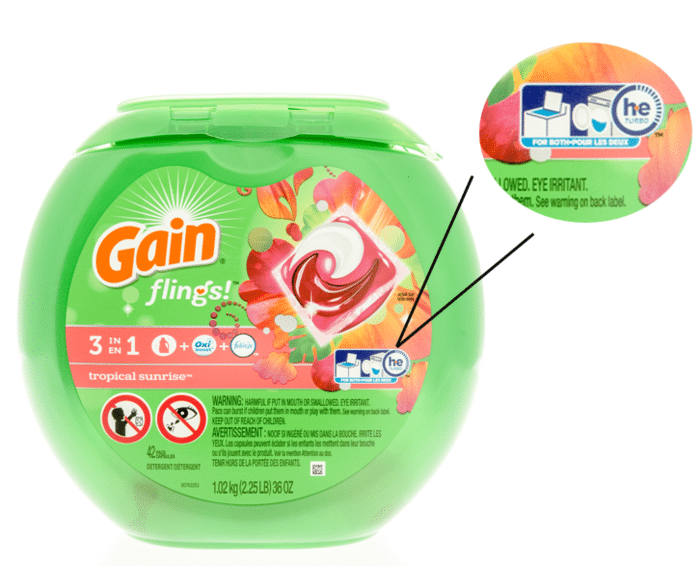
#5 Price
The price of washing machines can vary depending on their type, size, capacity, and features.
Washing machine prices vary greatly; some models cost $400, while others can reach up to $3,400! But the average is usually around $900. Just keep in mind that, typically, top-load washers are more affordable than front-load machines.
You see, front-load washers typically cost more than top-load washers because they have a more complex design and advanced technology.
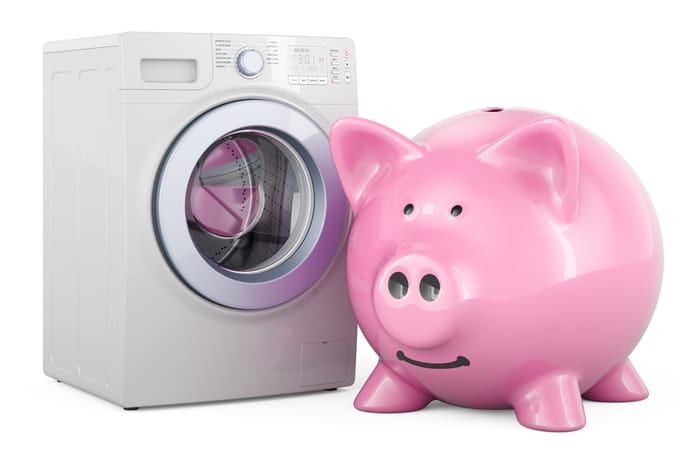
But remember that they can use less water and energy and have a larger capacity, saving you money in the long run!
#6 Materials
Moving on, it’s also important to consider the material of the drum when buying a new washer.
Plastic drums are very popular in affordable washers; however, I’m not too fond of this material because it can easily develop strange odors and get damaged when using hot water.
Porcelain-coated drums aren’t recommended either, as they can get chipped by zippers or other metal objects, which can cause the exposed steel to rust.
I suggest looking for a washing machine with a stainless steel drum. This material is more durable, rust-resistant, and easier to clean.
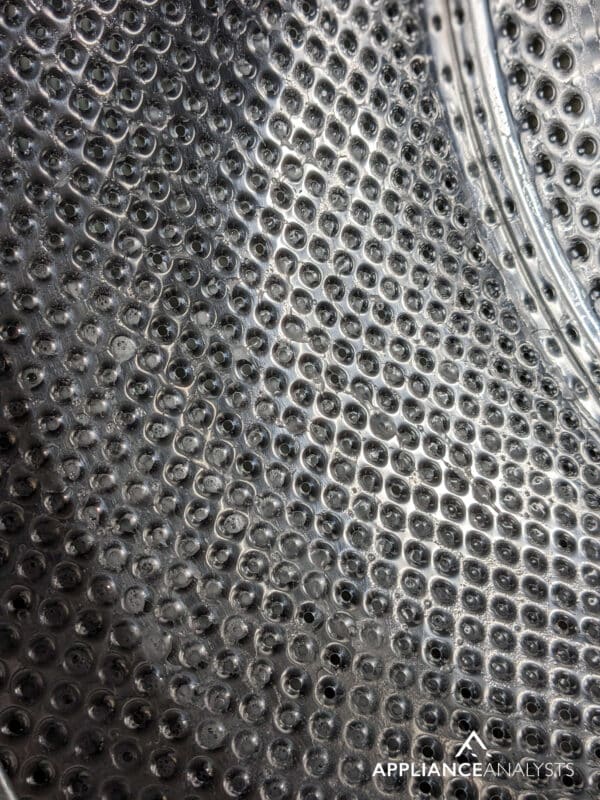
But keep in mind that washers with stainless steel drums can be more expensive.
#7 Wash Programs
You should also ensure the washing machine you want to buy has the programs or cycles you need.
For example, some washing machines have a “Delicate” setting, which is great if you want to take extra care of your fancy clothes.
But be careful not to get a washer with too many cycles you don’t need. I’ve seen some washing machines that come with special settings, such as “Babies,” “Pets,” or “Sportswear,” that are likely not relevant to your lifestyle.
So, if you’re like me and live alone or have a small family, you probably only need basic cycles.
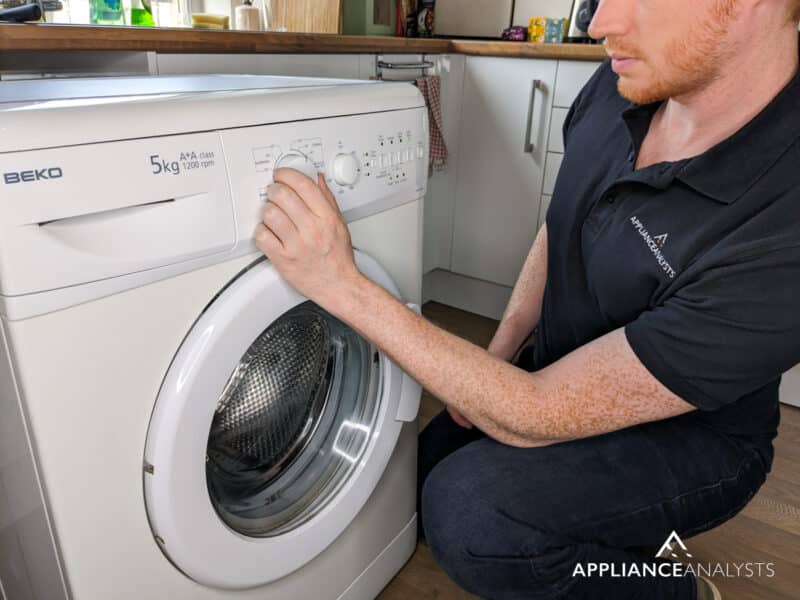
#8 Reviews
When buying a new washer, it’s also important to read reviews.
Reviews can help you learn about the experience other customers have had with the product and give you an indication of the washer’s effectiveness.
If you see that the washing machine has lots of positive reviews, it’s a good sign that it will meet your expectations. However, if you notice a lot of negative reviews, I recommend considering another option…it’s always better to be safe than sorry!
You can easily search for the reviews by entering the washing machine brand and model number you’re planning to buy on Amazon’s or Home Depot’s search bar.
Choosing the Right Washer
Now that you’ve read this washer buyer’s guide, it’s time to make a decision.
Remember to take into consideration your lifestyle, space, and budget. For instance, if you have a big family and do multiple weekly laundry loads, a large-capacity (4.5 + cubic feet) front-load washer is a good fit for you.
If you care about the environment and want to save water (and money), you should also consider buying a front-load washer, as it uses less water and energy than top-load machines. Don’t forget to look for a High-Efficiency or Energy Star-certified washer.
On the other hand, if you have limited space and a tight initial budget, a top-load washer is the way to go.
When buying a new washer, don’t forget to consider the features that can simplify your laundry routine, such as the automatic dispenser or auto-sensing feature.
Keep in mind that the ultimate decision will depend on your unique needs and preferences. Try ranking the recommendations provided in this washer’s buying guide based on what’s most important to you.
Then, carefully evaluate your options and make the right choice.
Frequently Asked Questions
Which is the most reliable washing machine brand?
When it comes to washing machines, the best brand for you will depend on your needs.
However, in my experience as an appliance repair expert, LG and Whirlpool are the best washer brands available, as they aren’t over-engineered and do a great job at cleaning.
Click here for a detailed analysis of the best washer brands!
How long do washing machines last?
On average, washing machines last for about 10 to 14 years. But, the lifespan can vary depending on the brand, how often you use it, and how well you take care of it.
Some washers can have a shorter lifespan if not well-maintained.
What size of washer do I need to wash a king-size comforter?
If you’ll wash big comforters, I suggest getting a washer with a larger capacity (4.5+ cubic feet).
Remember, it’s best to wash the comforter by itself, so it can move freely and get cleaned evenly.







